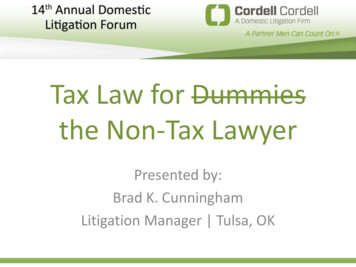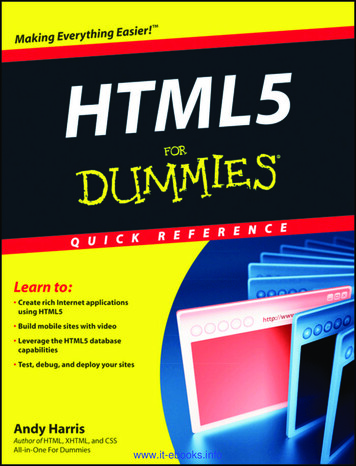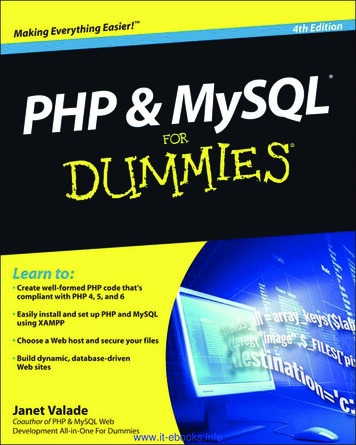
Transcription
Tax Law for Dummiesthe Non-Tax LawyerPresented by:Brad K. CunninghamLitigation Manager Tulsa, OK
“Nothing can said tobe certain, butdeath and taxes”- Benjamin Franklin
Taxes and Accounts can play a big rolein any family law disputeLOUIS
Why is this important?Separation ofProperty andFinancesMay have taxconsequences orconsiderationsCounsel, judgesand parties maynot be aware
Caveat Emptor Federal onlyI am not a CPA/expertConsult a CPA/expertConfirm above in writing to clientHyperlinks for referenced material
Presentation Overview Understanding the personal tax returnExplanation of filing status optionsLiability issuesDependency ExemptionsChild Support and Alimony IssuesProperty Division Tax Issues
Part 1: Understanding thePersonal Return
Become a Tax DetectiveW210401040 Schedules
Call for back up Complex returnsBusiness interestsCapital gain/lossCarryovers
Part 2: Filing Status Explained
5 Filing StatusesSingleHead ofHouseholdMarried filingjointlyMarried filingseparatelyQualifiedWidow(er) withdependent child
When am I single again? Determined as of December 31st Example:– Tax payer is divorced on December 30th– Not married for the entire year– He/she has to file as single or HOH for that tax year Order of separate maintenance impact
Marginal Tax Rate Tax paid on the next dollar of income Increases as you go (lowest to highest)–MFJ–HOH–Single–MFS
Head of Household Unmarried Cannot be a nonresidentalien Furnished over ½ of thecost of maintaining ahousehold for more than½ of the tax year for achild
Married HOH During separation may be able to file Strict requirements must be met
Using HOH Effectively When there are two or more children withequal placement, parties may be able to eachclaim HOH
They think of everything Taxpayer may still be eligible to file HOH evenif the qualifying child has been kidnapped
Marital StatusTax payers are considered married if they: Are married and living together Living together in common-law marriage recognized in thestate where they reside or where the marriage began Married and living apart but are not legally separatedunder a decree of divorce or separate maintenance– Still married if voluntarily separated Separated under an interlocutory decree of divorce
Married persons have options File joint or separate Yearly election Separate means same deductions(itemized/standard)
Same sex married tax payersFederalMarriedState by stateStateMock federalreturns
Common filing problems So a client walks in to my office .
“Spouse said they would sign jointreturn but now won’t” Joint return can only be filed if–both agree; and–both parties sign the return* A court will not (should not) order an unwilling spouseto file jointly, unless it was part of a settlement
“Filing MFS returns; who gets houserelated deductions?” Mortgage interest and property taxes Only owners can claim If the home if jointly owned:– Spouse that actually pays those expenses can claim if paid outof separate funds If paid from joint funds each spouse can claim one-half Otherwise by agreement
Filing MFJ during divorce Pros:– Lowest marginal tax rate– Highest deductions Cons:– Cannot deduct alimony– Jointly and severally liable– Division of tax refund/deficiency
Part 3: Liability Concerns
Annulment As though marriagenever existed File amended returns formarried years SOL (3 years)
Married tax payer liabilityJointly and severally liable.Relief options: Innocent Spouse relief Separation of liability Equitable relief IRS Publication 971 & IRS Form 8857
Basic question to ask client Did you know or have reason to know?– Standard: Reasonable, prudent tax payer Then call a tax attorney
Liability Flow ChartsFrom Pub. 971
Part 4: Dependency Exemptions:Fighting over the kids again
Dependency exemption Before we make a scene:– Is there something to fight over?– Is it worth fighting over? Qualifying dependent Deal breaker/mediation killer
Qualifying Child RelationshipResidenceAgeSupport
Is this worth fighting about?Per child: 2011: 3700 2012: 3800 2013: 3900 2014: 3950 Can be a lot ofmoney dependingon children ages Can be emotionalissue for theparties
IRS Default Rules If a divorce decreeis silent regardingthe dependencyexemption, itremains with thecustodial parent(IRC 152(e)) “Custodial Parent”– parent who hasthe physicalplacement of thechild for the greaterportion of thecalendar year (itonly takes one day)
Equal time rules Highest AGI claims child(ren) Parties can agree otherwise– IRS Form 8332 Never actually equal (365 days)– Tip: client should keep record of days if noagreement
Other impacts of dependencyexemption Dependent Care Credit Child Tax Credit ( 1,000) Hope and Lifetime Learning Credits Side note: What is a credit?
Possible solutions1. Exemption follows the children (IRS Rule)2. Alternate years–With option to sell/trade to other spouse3. Most advantageous filer claims children–Divide savings with other spouse as child support4. Contingent on compliance with other provisionsof the decree (i.e. child support)– Possible issues
Part 5: Child Support andAlimony
Taxation of child support Not taxable to recipient Not tax deductible to payor
Definition of child supportIf any one of the following: Designated as child support; Reductions tied to a child’s pivotal birthday; Reduction tied to pivotal child event(employed, death, graduation); or Reduction clearly associated with a childrelated event
Identified as child support Call it child support Even after child is an adult Must be a fixed payment– But does not require a fixed number
Good intentions, but child support Payments terminating on contingency relatedto child are child support I.e. Alimony that terminates on a child’s 18thbirthday Other:– Marries, dies, employment, school, college
Payments associated with acontingencyA presumption exists that payments are “clearly associated” with achild-related contingency, and are child support, if: Payments reduce within 6 months of child reaching majority age; or Alimony step down on 2 or more occasions that occur within 1 yearof the children reaching any age between18 to 24.–This certain age must be the same for each child, but need not be whole numberyears.
Allocation of lump paymentsIf the divorce document describes one lumppayment each month and does not explicitlyapportion an amount as child support, theentire payment will be treated as income to therecipient and deductible to the payor. Comm’r v. Lester
Taxation of alimony Alimony is deductedfrom the payor’sincome and taxableto the recipient
Definition of alimony (IRC §71) Payment in cash Received by (or on behalf of) a spouse under a divorce orseparation instrument, Which does not designate such payment as a paymentwhich is not includible in gross income under this section, The payee spouse and the payor spouse are not members ofthe same household at the time such payment is made, and Payment terminates on the death of the payee.*This is independent of the State’s definition*Must meet all requirements; parties’ intent is not a factor
Unconventional alimonySo long as alimony requirements are satisfied, paymentsof rent, taxes, health insurance, life insurance, etc. of thepayee spouse under the terms of a separation or divorcedocument will qualify as alimony. MUST be in a written separation or divorce instrument Payments made to maintain joint property or propertyowned by the payor do not satisfy the requirements
Alimony recapture rule–When the amount paid in the third year plus 15,000 isless than the amount paid in the second year, and–When payments in the second and third years areaveraged and this average plus 15,000 is less than thepayments in the first year–Does not included payments made under a temporaryorder, only under a final document or payments made ona percentage of income over 3 calendar years
Recapture ExampleIRS Example: Your client pays their formerspouse 50,000 alimony the first year, 39,000the second year, and 28,000 the third year. Isthere any recapture?Use Worksheet 1 to find out:
1Alimony paid in 2nd year2Alimony paid in 3rd year228,0003Floor315,0004Add lines 2 and 35Subtract line 4 from line 16Alimony paid in 1st year7Adjusted alimony paid in 2nd year (line 1minus line 5)78Alimony paid in 3rd year89Add lines 7 and 8967,00010Divide line 9 by 21033,50011Floor1112Add lines 10 and 1113Subtract line 12 from line 614Recaptured alimony. Add lines 5 and 131 39,0004 43,0006 00
7 Alimony Tips1. Dollars.2. Documents.3. Designation.4. Distance.5. Death.6. Dependents.7. Declining.
Part 6: Property Division TaxConsequences
General Rule Property transfersbetween spouses“incident to adivorce” are not ataxable event
Retirement Accounts Qualifiedaccounts useQDRO– Recipient maywithdraw withoutpenalty Properlycomplete IRS Form5329 Non-qualifiedplans get sametreatment if rulesare followed
Marital Residence Cost basis – sales price gain/loss Capital gain exclusion rule
Special rules for divorced seller Get married term of ownership Qualifies as principal residence*Important because if fail to meet principalresidence requirement then part or all ofexclusion may be forfeited– Be aware of amount of gain when deciding who should keep residence
Exception to general non-tax rule Non-qualified stock options and deferredcompensation are considered “income” and notproperty so there transfer is not tax-free Taxes will be withheld at the time of payment Rev. Rul. 2004-60
Useful IRS Links IRS Publications501 – Exemptions, Standard Deduction and Filing544 – Sales and Other Disposition of Assets590 – Individual Retirement Accounts972 – Innocent Spouse ReliefIRS Forms8332 – Child Dependency Exemption Release8379 – Injured Spouse Allocation8857 – Request for Innocent Spouse Relief
Conclusion Taxes are complicated. Know when to employan expert.
The Art of Litigating aFamily Law Case on aBudgetPresented By:Kelly BurrisTeam Leader Austin, TX
What Kind of Case is this?
What Kind of Budget Are We Talking?
The Lesser of the Evils4 Bad Approaches1. Flat fee that the client can afford;2. Lowered hourly rate;3. Same hourly rate, but expect the clientwill owe you after the case;4. Do as little work as possible so youdon’t bill the client as much.In Summary, THINK very carefully beforetaking the case!!
Essentials to a Budget Case fromBeginning to End!OrganizationEfficiencyCommunication
During the Interview Process, Determine: How complicated are the issues? What are the client’s expectations? Can the case be completed with minimal costs even if youpinch all of your pennies? Don’t get in the case if you know you’ll have to withdrawbefore the end. Is the client high maintenance? What is the source of funding? Family? Client? Opposing party?
What Exactly Do You Want From Me? Get a grip on your client’s goals! Ask the client to rank his or her goals in order ofimportance Tailor the interview to the goals the client has listed Determine the client’s pace and how the clientenvisions the case Remind the client about settlement optionsthroughout Remind the client that he/she makes the decisions
What Am I Getting Myself Into? Get the whole story, even if it doesn’t seem important! Make the client do a history Make the client give you a list of potential witnessesPrepare disclosure responses Keep a watchful eye on funding and remind the client todo the same Have the client prepare a financial information statementat the first meeting.
What are the Odds? Prepare the client for what to expect from the process. Be aware of the client’s stress and try to be sensitive totheir needs. Know guidelines and standards in the law. The sooner you start, the better your odds.
If You’ve Got the Money, Honey, I’ve Got the Time! Don’t ever estimate the cost of the case, no matter how muchthey want you to. Be cautious of the time you bill and your client’s budget. Get financial information from your client in the first week(FIS, Pay Stubs, Tax Returns). Consider Interim Attorney’s Fees
Using Your Client to Your (And Their) Advantage: Make sure your client knows the financial limitations of theircase and know they will pay for contact with you. Have the client call staff first. Get the most out of client meetings and try to keep themshort. How much can be done over phone and e-mail? Get as much accomplished as possible in your firstmeeting. Prepare for the meeting with a bullet-point list.
Using Your Client to Your (And Their) Advantage: Use your client as staff. Discovery, Spreadsheets, Organization. Can your client be a semi-expert? Experience in a childrelated field? Financial field? Business?
Avoid Problems with PreparationUnexpected Results Are NEVER a Good Thing! Prepare from the very beginning. Narrow down your discovery requests. Request admissions and stipulations to narrow downissues. Pre-trial hearings and conferences can be extremelyhelpful for discovery! Think twice about using a cheap mediator or custodyexpert and be choosy where to spend your money.
Discovering Without Discovery Have your client gather as much information as possible and useyour client’s contacts. School Records and Doctor’s Records. Business and Financial Records Recent Appraisals Have your client take a business recordsaffidavit when gathering documents.
Discovering Without Discovery Use pre-trial hearings for discovery Take detailed notes on direct and cross. Get an agreement from the court and oc to copy all exhibits. A transcript is cheaper than a lengthy deposition. Bring your authorizations or other issues you need to addresswith oc to the hearing. Agree to some informal discovery with oc to narrow requests forproduction - You both have stuff the other person wants.
Momma Ain’t Always Right:Finding Out The REAL Story Have your client maintain a custody calendarbefore and throughout the case (great, cheapexhibit) Have your client keep a journal and sendfrequent updates Start discovering long before you’re servedwith discovery Interview potential witnesses and expertsand keep notes Who needs to be listed and deposed
Momma Ain’t Always Right:Finding Out The REAL Story Request records early and often Have the client fill out release forms Subpoena documents Get business records affidavits or written depositions Keep in mind how long it might take to obtain financial docs Answer discovery timely and keep it updated (Watch out forexperts!) Video or audio depositions
Picking Your Battles You have to know when to hold em’ and know when to foldem’! Be candid with your client and don’t waste money onfights you cannot win. Can the parents work together without fighting, drinking ordrugging? If “yes,” then joint legal custody. When joint legal custody is not appropriate: The parents CANNOT work together Family violence One bad parent (not involved, drugs, drinking, etc.)
Picking Your Battles Child support: Should we REALLY be arguingabout this? The rights and duties the client cares about: Right to make educational decisions Right to make medical decisions Right to make psychological decisions Right to consult Cost/Benefit of the Assets Pots and Pans Let her have it if she thinks it’s worth that!
Expecting Experts?What kind of experts do you need, what kind do you already have,and which ones do you want to avoid? Can your client afford an expert? Do you REALLY need one? Will talk to the same people as thejudge. Who do you need? Counselors (for the parties or the kids), psychiatrists,psychologists, addictionologist, bonding expert? Accountant, Appraiser? Avoid “Dual Role” Experts Testifying v. Consulting Experts Beware of the “Hired Gun”
Expecting Experts? Do you already have experts? Who is already involved in your case? Teachers, doctors, counselors, CPA’s, appraiser,psychologists, your client? Appraisal or Market Analysis completed for some otherpurpose?
Psychologists, Psychiatrists and LPC’S Uses: Custody Evaluations Psychological/ Psychiatric Evaluations Therapeutic Custody Evaluations/ Social Studies Cruelty or Abuse Allegations Addiction or Drug/Alcohol Abuse
Psychologists, Psychiatrists and LPC’S Standards: American Psychological Assoc. Guidelines for Child CustodyEvaluations www.apa.org Practice Guidelines for the American Psychiatric Assoc.www.psych.org Practice Parameters for the American Academy of Child andAdolescent Psychiatry www.aacap.org Missouri State Committee for Professional Counselorshttp://pr.mo.gov/counselors.asp Model Standards of Practice for Child Custody EvaluationAssoc. of Family and Conciliation Courts
Dual Role Experts . . . or Not Therapeutic expert v. forensic expert A dual role expert is a therapeutic expert used in a forensiccapacity Why it’s tempting: It’s SOOOO much cheaper!! The therapist usually knows the history; One expert for everything!
Dual Role Experts . . . or Not Why it’s a bad idea: Ruins the therapeutic relationship and can be damaging tochildren in therapy Therapeutic experts need a signed release Tasks and goals are different for therapist and forensicexpert In a budget case, use them. Just watch what you ask Limit questioning therapeutic expert to: Diagnosis Treatment NO RECOMMENDATIONS
C.P.A. TYPES & USES: In-House Accountants Not Forensically Savvy Requires Additional Preparation Attorney Must Personally Go Over Relevant Documents Tracing/ Characterization Experts Business Valuations Proving Economic Contribution / REIMBURSEMENT STANDARDS: Missouri State Board of Accountancy- http://pr.mo.gov/accountancy.asp GAAP- Generally Accepted Accounting Principles AICPA- Code of Professional Conduct- www. AICPA.org
REAL ESTATE APPRAISERS TYPES: Residential Appraiser Commercial Property Appraiser STANDARDS: USPAP- Uniform Standards of Professional AppraisalPractice www.appraisalfoundation.org Many states require appraiser to pass test to becomea certified or licensed appraiser MAI- Highest Recognized Certification Missouri Real Estate Appraiser Commission http://pr.mo.gov/appraisers.asp
Court Appointed v. Hired Gun Court Appointed: Unpredictable Outcome: Could hurt as much as help. Unpredictable Quality of Expert: Court unlikely toappoint the best expert available. Court is likely to rely heavily on expert’s opinion. More difficult to impeach, especially if judge usesexpert on many cases. Will have access to all parties and cooperation from allsides. Court will often split expense.
Court Appointed v. Hired Gun Hired Gun: Can hire the most qualified expert available. Will likely only have access to one side, so cannot docomplete evaluation of all sides. Easily impeachable due to bias for hiring party, socourt is less likely to rely on expert’s opinion. Most often used to impeach opposing side or courtappointed expert. The hiring party foots the bill!!
Preparing Your Client for an Evaluation If you’re going to spend the money, make it worth while. Explain the purpose of the evaluation and that the expert acts asthe eyes and ears for the court. This is NOT confidential. The expert is NOT your therapist.
Preparing Your Client for an Evaluation Make sure the client does not vent personal issues to theevaluator. Express concerns for the children, but be cautious ofappearing to alienate. In order of importance, client should discuss:1. Love for children and will do what is in their bestinterest;2. Efforts to co-parent and importance of co-parenting;3. Why requested access is in best interest (e.g. “I canprovide a better environment because . . .”)4. Concerns about the children;5. Concerns about the other parent.
Clients with “Issues” You are NOT a therapist Make your client sees a therapist, psychologist,psychiatrist, or someone who is more cost effectiveat dealing with your client’s mental and emotionalproblems. Figure out if your client, and you, can survive a socialstudy, drug testing or an amicus. Don’t volunteer your client for things which will hurtyour case. If you can’t trust your client, think twice about it.
Clients with “Issues” Use the Empathic Sandwich. Always give your client two choices You can abide by the court order and X willhappen or you can violate the court order and Ywill happen. Always remember that, in most cases, ducks marryducks. PAPER YOUR FILE!!! A mentally ill or drug addictedclient is extremely unpredictable.
Making Pigs Fly and Dealing with Other UnreasonableExpectations Without Losing Your Cool Review the statute or case law and give the client a copy. Mediate your case and spend some money to do it! Cheap or free mediations are usually a waste ofmoney Most cases will settle and if they don’t, you find out alot about the case. Paper your file.
Making Pigs Fly and Dealing with Other UnreasonableExpectations Without Losing Your Cool Cost/benefit analysis every step of the way. Explore alternate agreements. Breakdown a Standard Schedule Rearrange Rights and Duties 50/50 Schedules Extra Overnights Phone and Computer Access Renting the house from the other spouse Contractual Support to equalize estate
Preparing and Presenting a Budget Trial Free witnesses- teachers, friends, neighbors, former spouses,minister Narrow down the witnesses Have your client list each witness with a paragraph about whythis person is important, then have the client rank them. Call each witness prior to trial and cut the “not so great” ones. Inexpensive demonstrative exhibits Summaries and Calendars Videos and Photos
Preparing and Presenting a Budget Trial Preparing or “wood shedding” your client is time and money wellspent. Outline what you intend to address and give themliterature to review regarding testimony Draft bullet-points for direct and cross instead of full questions. Narrow down the exhibits to what you really want the judge tosee. If testimony will do, you don’t need a bolstering exhibit. Too many exhibits is a waste of money and the judge will notlook at them all. Use some to refresh or impeach without entering the exhibit.
Preparing and Presenting a Budget Trial Brush up on Evidentiary Rules- You can get many exhibits enteredwithout spending time and money to find tricky ways around it.(i.e. not offering for truth of the matter asserted). If you can’t afford a trial brief, bring highlighted copies of caselaw. Appeal: If your client has money to appeal, then you shouldn’t havebeen so cost effective at trial. Wage your battle here and now, but keep an eye open topreserving your record just in case.
“Happy families are all alike;every unhappy family isunhappy in its own way.”-Leo Tolstoy (1828 - 1910), Anna Karenina,Chapter 1, first line
10-Minute Break
Military Issues in DivorcePresented by:Jason A. BowmanSenior Attorney Louisville, KY
Brief History2 interesting facts World War II– Approximately 16.1 million Americans deployed Majority were men Average deployment 16 months Distance and Numbers posed numerous challenges
V-Mail Invented by Britain adoptedby Department of Defense Mail took up to much room on supply ships,all mail was transferred onto microfiche,shipped across ocean and recreated beforebeing delivered.
Divorce In the Military With an average deployment of 16 months an manymarriages occurring prior to deployment, onlycommunication back home was through the mail. Majority would be begin with “Darling” or MyDearest Johnnie, or Dear Johnnie. In 1945, a reporter for the Democrat and Chronicle, anewspaper out of Rochester, New York noted thatafter long deployments the letters changed andstarted with “Dear John, I have found someoneelse.” the invention of the Dear John letter.
Jurisdiction IssueWhere do you file your action?In the military there are big differences betweenyour “home of record”, where you are stationed,temporary duty assignments and domicile.Need to find the Court with the best jurisdiction forall issues.
Home State (“Home of Record”)Technical term that Department of Defense uses to specify the state orterritory which is the home of a person upon entry on active duty orreenlistment.Administrative entry, not intended to specify the domicile of militarymember at any timeHowever, several states have statutes that relate back to this designation forpurposes of filing for divorce
Stationed or temporary dutyassignment Several states have statutes that will allow, servicemembers to file for dissolution if they are stationedin the state for a prescribed period of time. Temporary duty assignments could result in a soliderresided in a state for the prescribedperiod of time, but the solider willleave after filing.
The key for divorce is domicileDissolution of a marriage can be granted in anystate where a party meets statutoryrequirements, but that Court may not havejurisdiction over other issues.
Jurisdiction over the marriage is“in rem” Williams v. North Carolina, 317 U.S. 287 (1942)– Divorce decrees are more than in personamjudgments– Each state, by virtue of its command over itsdomiciliaries and its large interest in the institution ofmarriage can alter within its own borders themarriage status of the spouse domiciled there, eventhough the other spouse is absent.
Other jurisdiction issues to consider Just because a court can grant a divorce doesnot mean that it can address all issues Custody issues: UCCJEA or UCCJA (dependingon state) will apply for custody
UCCJEA Home state is given priority A Court has jurisdiction to make initial custodydetermination ONLY if:– The home states of the child upon commencement ofthe proceeding or was the home state with 6 monthsbefore commencement and the child is absent fromthe state, but the parent continues to reside in thatstate. Court can decline to exercise jurisdiction
UIFSA Same home state requirement as in UCCJEA Courts however, cannot decline jurisdiction
Jurisdiction Trap Uniform Service Former Spouses’ Protection Act(USFSPA). In order to enforce orders to divide retired paythe state court must have jurisdiction over theservice member by:1. Residence in the jurisdiction (other than becauseof assignment);2. domicile in the jurisdiction;3. service member's consent to jurisdiction
Now that we dealt with Jurisdiction What’s NextCompensation/Child SupportRetirementDomestic ViolenceOther SpecialIssues
CompensationWhat is an LES? Leaving and earnings statement (LES) LES are not like regular pay stubs Lots of information– All pay and allowances– Current rank, years of service– Date they entered the service, estimated date they willleave– State of record for income tax purposes– Accrued leave
Base Pay BAS BAH Total Entitlements
Can haveup to six.What arethey for?DiscretionaryAllotments
Grade O-4Years of Service 20
Pay Date is date theyentered serviceApril 1, 1979ETS expiration term ofservice
WestVirginiaState ofResidence forTax Purposes
Used andunusedLEAVE
Child Support Calculations Most states will use not only a soldier's basepay, but will also include their:– Basic allowance for housing (BAH) and– Basic allowance for substance (BAS)
Military Regulations Require Support Military default rate in child support cases is ½that of the civilian world Each branch of the military has regulations forsupport absent a court order
Air Force Regulations Hands off approach, encourages use of civiliancourts Advises members that they are expected toprovide adequate financial support to familymembers
Marine Regulations “The Marine Corps will not serve as a haven forpersonnel who fail to provide adequate and continuoussupport to their family members.” U.S. Marine Corps, OrderP5800.16a Marine shall pay either a fixed amount from thefinancial support standards or a share of the BAHreceived by Marine, whichever is greater Also this regulation is punitive and punishable underthe UCMJ.
Navy Regulations Unit Commander has the authority to direct paymentsto spouse using Navy Guidelines––––––Spouse only 1/3 gross paySpouse and one minor child ½ gross paySpouse and two or more minor children 3/5 of gross payOne minor child (no spousal support) 1/6 gross payTwo minor children (no spousal support) ¼ gross payThree minor children (no spousal support) 1/3 gross pay
Army Regulations As the largest branch of the military, it hasthe most complex non-support regulations Google AR 608-99 to see regulation Requires a soldier to provide a portion of his BAH withdependents Purpose of regulation is to provide family member withsome support until an agreement or court order can beobtained. Punitive Regulation and subject to punishment under UCMJ
Retirement Issues Remember jurisdiction requirements to divideretirementGOOD NEWS WHEN DIVIDING MILITARYRETIREMENT
QDRO
The 10-Year Rule The service will directly pay a division ofmilitary retired pay If the parties were marriedfor at least ten years during which themember performed at least ten years ofcreditable military service– 10 U.S.C. Section 1408 (d)(2)
“Disposable” Retired Pay The only subject of division of military retired pay is the“disposable retired pay” of the service member.– Disposable retired pay is defined as the totalmonthly retired pay to which a member isentitled less certain deductions.– Be careful in drafting agreements that state “gross” “net”or “net disposable” military retired pay, as this does notreflect the term section
Tax Law for Dummies the Non-Tax Lawyer Presented by: Brad K. Cunningham Litigation Manager Tulsa, OK “Nothing can said to be certain, but death and taxes” . MUST be in a written separation or divorce instrument Payments made to maintain joint property or prop










